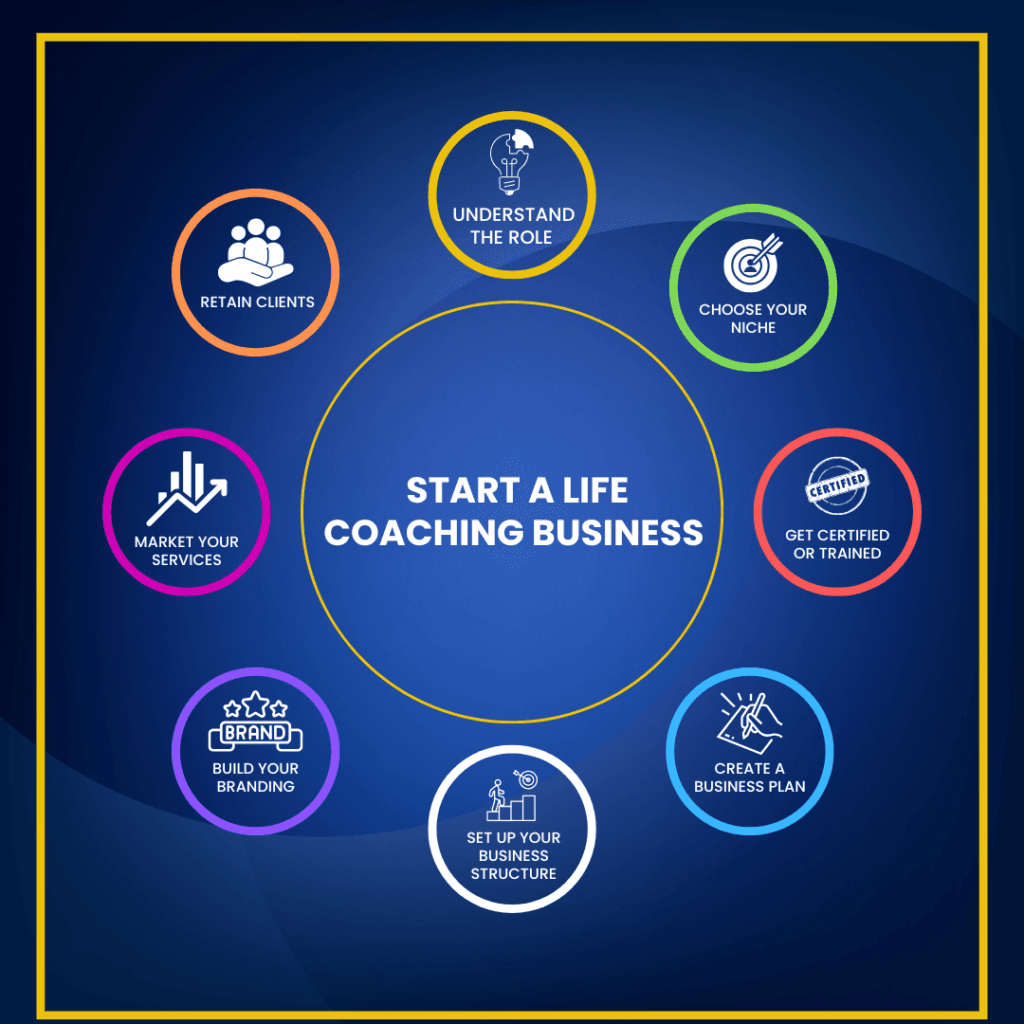Starting a life coaching business is a rewarding way to empower others while building a fulfilling career. As more people seek guidance to overcome challenges, improve productivity, and achieve personal or professional goals, the demand for skilled life coaches continues to rise. If you’re ready to make a difference and create a thriving business, now is the perfect time to get started.
This guide will walk you through every step of how to start a successful life coaching business. Whether you’re exploring how to choose a niche, earn a certification, or attract and retain clients, you’ll find actionable tips and strategies to set you up for success.
So read on, and let’s build the foundation of a business that inspires growth for you and your clients!
How to Start a Successful Life Coaching Business

Step 1: Understand the Role of a Life Coach
Before diving in, it’s important to fully grasp what life coaching involves. Life coaches help individuals set and achieve personal or professional goals, improve confidence, manage stress, or navigate major life transitions. Unlike therapists, they don’t diagnose or treat mental health issues but focus on future-oriented growth.
Spend time researching the daily responsibilities of a life coach. This includes conducting one-on-one sessions, creating action plans, offering support, and holding clients accountable. Understanding the role will help you determine if this path aligns with your skills and passions.
Step 2: Choose Your Niche
Life coaching is a broad field, so narrowing down your focus will help you stand out. Popular niches include career coaching, health and wellness, relationships, and executive coaching.
Reflect on your strengths, experiences, and passions. For example, if you’ve had success in corporate leadership, executive coaching might be a good fit. Specializing allows you to target specific clients and tailor your services to meet their unique needs.
Step 3: Get Certified or Trained
While certification isn’t mandatory, it adds credibility and equips you with essential coaching skills. Programs accredited by the International Coaching Federation (ICF) are widely recognized.
Certification courses teach active listening, goal-setting techniques, and ethical coaching practices. They often include hands-on training, which builds confidence and practical experience. Invest time in researching programs that align with your goals and budget.
Step 4: Create a Business Plan
A business plan acts as a roadmap for your life coaching business. Start by defining your target audience, goals, and the services you’ll offer. Outline pricing strategies, potential expenses, and income projections.
Think about the logistics: Will you offer in-person sessions, online coaching, or both? What tools or platforms will you use for scheduling, communication, and payment? A clear plan helps you stay organized and focused as you launch and grow your business.
Step 5: Set Up Your Business Structure
Decide on the legal structure of your business, such as a sole proprietorship or LLC. Each structure has different tax and liability implications.
Register your business name, obtain the necessary licenses, and set up a separate business bank account to keep your finances organized. Consult with a legal or financial expert to ensure compliance with local regulations and tax requirements.
Step 6: Build Your Branding and Online Presence
Your brand is how clients will perceive you. Create a professional website that showcases your services, experience, and testimonials. Include a clear call-to-action (e.g., “Book a Free Consultation”).
Establish a presence on social media platforms like LinkedIn, Instagram, or Facebook, where potential clients spend time. Share valuable content, such as motivational tips or success stories, to build credibility and attract followers.
Step 7: Market Your Services
Marketing is key to finding clients. Start by networking within your community and attending events where potential clients or collaborators may be present. Offer free workshops or webinars to showcase your expertise.
Leverage social media ads or Google Ads to reach your target audience. Encourage satisfied clients to leave reviews and share referrals, as word-of-mouth remains a powerful marketing tool.
Step 8: Deliver Outstanding Coaching and Retain Clients
The quality of your coaching determines your long-term success. Be empathetic, listen actively, and tailor your strategies to each client’s needs. Create measurable goals and provide actionable steps to achieve them.
Follow up regularly and celebrate client milestones to show you’re invested in their success. Offering ongoing support or advanced coaching packages can also help you retain clients and generate steady income.
Overcoming Common Challenges in Life Coaching

Challenge 1: Finding Clients
Many new life coaches struggle to attract clients, especially in the beginning.
How to Overcome:
- Leverage social media and professional networks to share your expertise.
- Offer free workshops or introductory sessions to showcase your value.
- Encourage word-of-mouth referrals from satisfied clients.
Challenge 2: Establishing Credibility
Without a proven track record, gaining trust can be difficult.
How to Overcome:
- Earn a recognized certification to boost your credibility.
- Share client testimonials and success stories on your website or social media.
- Publish valuable content, like blogs or videos, to position yourself as an expert.
Challenge 3: Setting Boundaries with Clients
Clients may expect constant availability, leading to burnout.
How to Overcome:
- Clearly define your working hours and communication channels upfront.
- Stick to your schedule and politely enforce boundaries if crossed.
- Use scheduling tools to manage sessions and maintain balance.
Challenge 4: Managing Self-Doubt
Impostor syndrome can affect even experienced coaches.
How to Overcome:
- Focus on your strengths and the positive feedback you’ve received.
- Invest in continuous learning to stay confident in your skills.
- Seek mentorship or peer support from other coaches to share experiences.
Challenge 5: Maintaining Client Progress
Clients may lose motivation or struggle to follow through with plans.
How to Overcome:
- Break goals into smaller, actionable steps to keep momentum.
- Celebrate small wins to encourage continued effort.
- Regularly check in and adjust plans to ensure they stay aligned with the client’s needs.
Conclusion
Starting a successful life coaching business requires determination, strategic planning, and a genuine passion for helping others. By understanding the key aspects of life coaching like selecting a niche, gaining certification, and creating a strong brand you can set yourself apart in a growing industry. Building credibility, marketing your services effectively, and delivering outstanding coaching experiences will not only attract clients but also ensure long-term success.
Challenges are inevitable, but with a proactive approach whether it’s managing client relationships or maintaining your confidence you can navigate obstacles with ease. The journey to becoming a successful life coach is as rewarding as the impact you’ll have on your clients’ lives. Take the first step today, and you’ll be on your way to building a thriving business that inspires and empowers others.
Ready to make your mark as a life coach? The tools and strategies are in your hands start turning your vision into reality!





